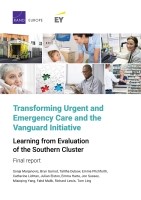| 来源类型 | Research Reports
|
| 规范类型 | 报告
|
| DOI | https://doi.org/10.7249/RR2062
|
| 来源ID | RR-2062-NHS
|
| Transforming Urgent and Emergency Care and the Vanguard Initiative: Learning from Evaluation of the Southern Cluster |
| Sonja Marjanovic; Bryn Garrod; Talitha Dubow; Emma Pitchforth; Catherine A. Lichten; Julian Elston; Emma Harte; Jon Sussex; Miaoqing Yang; Fahd Malik; et al.
|
| 发表日期 | 2017
|
| 出版年 | 2017
|
| 页码 | 287
|
| 语种 | 英语
|
| 结论 |
Delivery on overarching aimsThe three Southern Cluster UEC vanguards have each been pursuing ambitious goals to transform the UEC landscape in their regions and provide more efficient and effective services. Despite a reduction in originally anticipated resources for vanguard activity, progress has been made across core activities.
- Clinical hubs are operational across the sites.
- Direct booking capacity into primary care is progressing more with out-of-hours than with in-hours services.
- Gradual but variable progress has been made towards joint planning and governance of UEC services.
- Efforts to ensure seamless data sharing between UEC providers, and an interoperable IT infrastructure, are progressing somewhat slower than originally hoped.
Other areas of progress relate to site-specific developments.
Drivers of progress- Vanguard funding and status had a positive catalytic role in pump-priming activities and assisting the pace of transformation efforts; it provided 'permission' and a 'space to innovate' in approaches to improvement.
- Committed leadership across professions and organisational levels and practical mechanisms to support joint working and interaction have helped support the vanguard vision and nurture increased trust between some providers.
- Despite examples of effective public engagement informing the design of the Southern Cluster UEC vanguards and supporting awareness raising about service options, the sites recognise a need for greater attention to this space in future efforts.
- Ensuring a critical mass of diverse health and care professionals supporting NHS 111 and the clinical hub remains a challenge.
- Data infrastructure and interoperability challenges will need to be addressed for longer-term impact at scale.
|
| 摘要 |
- Establish new incentives, skills and accountabilities in the health and care workforce
- Coordinate more closely between local and national efforts
- Nurture and further strengthen collaboration between stakeholders and across professional groups, including with the public
- Consider how vanguard activities can support an end-to-end UEC pathway, securing a whole that is more than the sum of its parts
- Improve availability of cost and outcome data to facilitate a robust business case for future scalability and sustainability
- Reinvigorate efforts to secure physical and relational resources for an interoperable data infrastructure
- Strengthen evaluation and learning capacity
|
| 主题 | Health Care Delivery Approaches
; Health Care Program Evaluation
; Health Information Technology Interoperability
; Mental Health and Illness
; Primary Care
; United Kingdom
|
| URL | https://www.rand.org/pubs/research_reports/RR2062.html
|
| 来源智库 | RAND Corporation (United States)
|
| 引用统计 |
|
| 资源类型 | 智库出版物
|
| 条目标识符 | http://119.78.100.153/handle/2XGU8XDN/108589
|
推荐引用方式
GB/T 7714 |
Sonja Marjanovic,Bryn Garrod,Talitha Dubow,et al. Transforming Urgent and Emergency Care and the Vanguard Initiative: Learning from Evaluation of the Southern Cluster. 2017.
|
|
文件名:
|
x1508158820955.jpg
|
|
格式:
|
JPEG
|

|
文件名:
|
RAND_RR2062.pdf
|
|
格式:
|
Adobe PDF
|
除非特别说明,本系统中所有内容都受版权保护,并保留所有权利。